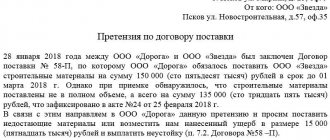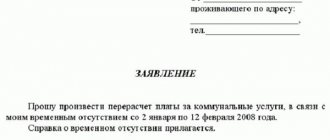The apartment building is connected to a centralized heating system
An agreement was concluded between an individual entrepreneur and the heat supply contractor for non-residential premises in an apartment building. The house was connected to a centralized heating system.
The owner shut off the radiators in the room without dismantling them and insulated the risers by connecting alternative heat sources. After that, he stopped paying the utility provider, because, in his opinion, he no longer received the service. The written agreement with RSO had expired by that time.
However, the resource supplying organization continued to send certificates of completion to the owner and issue invoices for payment for the supplied resource. All claims sent to the consumer in connection with the growing debt remained unanswered.
The service provider filed a lawsuit demanding to collect 250 thousand rubles of debt and penalties from the entrepreneur. The owner did not agree with the RSO requirement for several reasons:
- The resource supply contract has expired.
- The radiators in the room are closed, the service is not provided, an autonomous heating system has been installed.
- No one lives in the premises, it is not used for business activities, therefore, the owner does not have to pay for utilities as an individual entrepreneur, and if there are no residents in the premises, the payment must be recalculated.
The legal dispute went through all possible authorities, and the Supreme Court of the Russian Federation put an end to it (case No. A51-5866/2018). Let us consider the arguments of the courts, which were unanimous in their decisions.
Why did the Constitutional Court of the Russian Federation demand a review of the heating billing system?
292179
The heat supply agreement with RSO is concluded in writing or through implied actions
The court of first instance, when considering the claim, examined each of the arguments of the owner, which he brought in his defense, asking to dismiss the RSO claim.
The judge indicated that resource supply agreements in non-residential premises must always be concluded directly between the owner and the resource supply organization (clause 6 of RF PP No. 354).
They can be concluded in writing or by the consumer performing implicit actions - indicating his intention to consume utility services or the actual consumption of such services.
The obligation to pay for the supplied heat energy arose with the entrepreneur due to the fact of consumption of heat energy, regardless of the presence or absence of a corresponding agreement in writing (Articles 539, 544 of the Civil Code of the Russian Federation).
The fact of delivery of thermal energy by the contractor to the non-residential premises of the defendant is confirmed by invoices, certificates of work performed, and an act of connecting the premises to the heat supply system.
Consequently, even in the absence of a written agreement with the utility service provider, the consumer is obliged to pay for thermal energy.
How to take into account legal requirements when paying for heating
317966
How to protect yourself from controversial situations
Both parties can protect themselves if they sign an agreement that defines the terms of division of responsibility. For example, they will just indicate who pays for the examination to find out whether the wear was natural or not.
Maria Zamolotskikh advises the tenant, when signing a contract, to carefully inspect the apartment and everything in it: walls, floors, radiators, plumbing, taps, household appliances.
If there are signs that some of the property may soon become unusable due to wear and tear or disrepair, you should inform the apartment owner about this and ask them to correct the defect. Otherwise, in the future, in the event of an accident, the owner may try to shift responsibility to the tenant.
Maria Zamolotskikh
Defects that do not need immediate correction and do not affect operation are also better indicated in the contract. When moving in, scratches on the laminate flooring may seem like nonsense to the tenant. And when moving out, the owner can easily feign amnesia and claim that it was the tenant who ruined the floor, and therefore will not receive the deposit back.
Disabling radiators and installing autonomous heating must be approved by the local self-government body
The court also did not confirm the owner’s argument that he did not consume thermal energy because he disconnected the premises from the centralized heating system of the apartment building. Autonomous heating equipment is installed in non-residential premises.
In accordance with paragraphs. “c” clause 35 of RF PP No. 354, the consumer does not have the right to dismantle or turn off heating elements without permission, or to regulate the indoor heating system equipment. These actions can lead to a decrease in air temperature in all areas of the house and an increase in the consumption of utility resources.
According to clause 1.7.1 of Rules No. 170, the conversion of residential and non-residential premises into apartment buildings is allowed only after obtaining the appropriate permits from the municipality. The completion of such reconstruction is confirmed by an act of the acceptance committee (Part 1 of Article 28 of the Housing Code of the Russian Federation).
The court referred to the resolution of the Constitutional Court of the Russian Federation dated July 10, 2018 No. 30-P, which states that the MKD is an integral system. Therefore, the owner of the premises cannot completely refuse to pay for heating services to the house, including common areas that are part of the common property of the house.
The owner of the non-residential premises did not provide the court with evidence that the insulation of the risers in the premises, the disconnection of radiators and the installation of autonomous heating equipment were carried out with the receipt of permits, and the premises were completely disconnected from the heat supply of the house. Therefore, he cannot be exempted from paying for the supplied heat energy.
Advantages and disadvantages of each type of payment for utility services
| Type of payment | pros | Minuses |
| Utility payments are included in the rental price | The tenant knows exactly how much he will spend for the apartment; | The tenant does not save resources; |
| The owner independently controls the payment of utility bills; | The owner spends personal time paying utility bills for rented housing; | |
| Both parties may not meet every month, but transfer the rent to the landlord's account; | The tenant may feel that they are being overcharged because they have no control over paying their bills; | |
| When tariffs for housing and communal services increase, the owner of the apartment can increase the rent, but no more than once a year. | In winter, housing and communal services tariffs usually increase; this must be taken into account. | |
| The tenant pays their own bills | The homeowner does not spend personal time paying bills; The homeowner's income will be stable; The tenant will be able to control the resources used. | The owner of the property needs to constantly monitor payment of utilities, and meet with the tenant every month to collect payments; There is a risk that the tenant will not pay utilities; In winter, apartment expenses will increase significantly. |
| Compensation for utility bills separately | Transparency of relationships: each party knows not to spend more money than expected; The homeowner is confident in paying utility bills; The owner's income is fixed; Tenants can save money by conserving resources. | The owner of the property will have to come for money in order to pay utility bills; The lease agreement will indicate that the amount varies - this is not beneficial when paying taxes. |
Recalculation for heating in the temporary absence of a consumer is not made
At the first instance, the owner's arguments were considered in detail that there is no business activity on the premises, therefore, the payment should be calculated according to tariffs for individuals. In addition, as the consumer argued, no one uses the premises, which means that RSO must recalculate the fee in case of temporary absence.
The court did not accept these arguments of the defendant, because:
- The consumer is registered as an individual entrepreneur and has not provided evidence of loss of this status.
- The defendant did not provide evidence that the non-residential premises are used for personal and/or domestic purposes, therefore, the calculation of heating fees cannot be made according to tariffs for the population.
- As follows from clause 86 of RF PP No. 354, the amount of heating fees is not recalculated in the event of a consumer’s temporary absence from a residential premises.
- Non-use of premises in an apartment building is not grounds for exemption from the obligation to pay for utilities for heat supply (clause 37 of the Resolution of the Plenum of the Armed Forces of the Russian Federation dated June 27, 2017 No. 22).
Have the formulas for calculating heating fees changed: a lawyer explains
5864035
What utilities must the tenant pay?
The tenant must pay for utilities, which are provided to him by the relevant companies.
The list of utilities depends on the engineering equipment of the housing with communications.
Let's look at the main list of utilities:
| Payment for water supply | If the apartment does not have a meter installed, then the amount of payment depends on the number of registered people and on the rate of water provided per person per day. |
| Payment for heating | The payment amount depends on the area of the apartment |
| Garbage removal | It also depends on the number of registered people in the apartment and the norm for 1 person. |
| Payment for gas supply | If the house is gasified and meters are not installed, then the amount of the receipt is calculated according to the number of registered people and according to the rate per person per month |
| Payment for electricity supply | A meter must be installed in the apartment, and its readings must be provided to the company providing the service on a monthly basis. The amount depends on the amount of resource used. |
All utilities must be paid on time. Payment deadlines are indicated on utility bill receipts.
If payment is not made, then companies can take the following measures:
- Limit the supply of resources;
- Stop the complete supply of the resource;
- Accrual of penalties.
The consumer may be exempt from paying for indoor heating if the radiators are legally dismantled
An important circumstance in the court case was also that the radiators in the room were not dismantled: they were only blocked off. This did not allow the owner to appeal to the legal position of the RF Armed Forces, set out in the ruling dated August 30, 2016 No. 71-KG16-12.
In this determination, the Supreme Court of the Russian Federation noted that the fact that networks pass through a non-residential premises in the absence of heat-receiving devices does not provide grounds for collecting heating fees from the owner. Since the heating radiators were not dismantled in the premises of the individual entrepreneur, the court of first instance did not take into account the reference to determination No. 71-KG16-12.
Having examined each argument of the owner, the court came to the conclusion that the contractor has the right to recover from the consumer the entire amount of debt and penalties for late payments.
Heating: tenants or landlord?
As a rule, the tenant pays for heating, since he is the one who uses this service . However, heating is also charged when the apartment is idle without tenants. Or, for example, a tenant rents a house for several months during the season without heating, and the amount for it is distributed in receipts for the whole year.
This is a two-fold question and for the most part everything will depend on how the landlord and the tenant can agree between themselves. Often, if both parties like each other, a solution is reached through a compromise.
Changes to the heat supply system must be approved by the local self-government body and included in the technical documentation
By filing an appeal, the owner of the premises tried to prove that the heating system in his premises was rebuilt in accordance with the procedure established by law.
He indicated that the heating radiators were closed by the organization managing the house and seals were installed, and the pipelines were insulated, and ventilation with a heater was installed in the room as an alternative to the centralized heating system. Consequently, the district heating service was not provided to him.
The Court of Appeal, considering the complaint, noted that the house in which the defendant’s non-residential premises are located has a single building-wide heating system. The owner of the premises did not provide evidence that his premises are structurally located separately from the multi-apartment residential building and do not have common engineering systems with those in the building or have a separate insulated thermal input.
The consumer does not have the right to arbitrarily dismantle or turn off the heating elements provided for in the technical documentation of the house, or make changes to the in-house engineering systems (clause 35 of RF PP No. 354).
Any intervention in the general building engineering networks requires an agreed project and changes to the technical documentation of the house. According to Part 1 of Art. 26 of the Housing Code of the Russian Federation, the reconstruction is carried out in compliance with the requirements of the law in agreement with the local government body.
When heating radiators are disconnected in the premises, the placement of which is provided for in the technical documentation, the consumer may be exempt from paying for heat supply services only under one condition: if he provides evidence that this was done in compliance with the approval procedures with local self-government bodies. The approval of the management organization or the acts of other specialists does not matter.
The Court of Appeal upheld the first instance decision. The Court of Cassation confirmed this position, and the Supreme Court of the Russian Federation did not consider the complaint, agreeing with its colleagues.
On a note
The issue of charging for heating in the premises of owners in apartment buildings has received a lot of attention since December 2021, when the Constitutional Court of the Russian Federation, in Resolution No. 46-P dated December 20, 2018, established that consumers with individual sources of thermal energy must pay only for the resource consumed for the purpose of maintaining common property.
However, the same resolution No. 46-P states that this applies only to those owners in whose premises the reconstruction of the heat supply system was carried out with the receipt of all permits. At the same time, all owners of premises in the house pay for the resource consumed to maintain the common property.
The case discussed above precisely implements the requirements voiced by the Constitutional Court of the Russian Federation that without registering the reconstruction in the manner prescribed by law, the owner is obliged to pay for centralized heat supply in full, even when installing autonomous equipment.
* * *
An apartment building is a complex, multifunctional and single object. The use of all its technical, engineering and other communications, as well as infrastructure, serves a single purpose - the maintenance and maintenance of the entire facility (that is, the house), including heating of housing construction according to established rules, quality standards (for example, maintaining a certain temperature regime). In this regard, housing legislation does not exempt citizens who have been disconnected from central heating from paying for the heat losses of the heating system of the apartment building and the consumption of thermal energy on the central heating system.
Housing and communal services: accounting and taxation, No. 4, 2021











